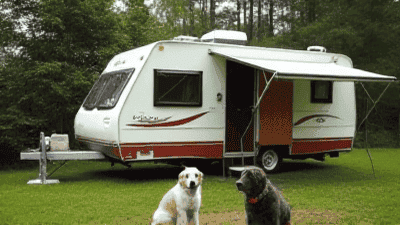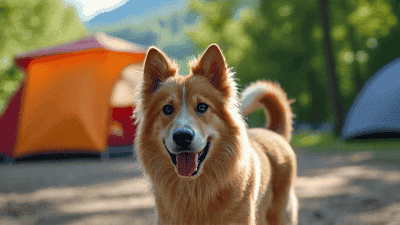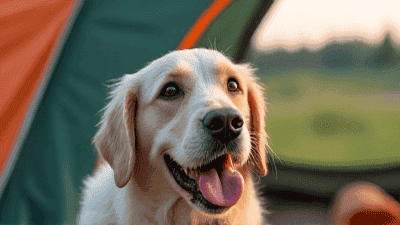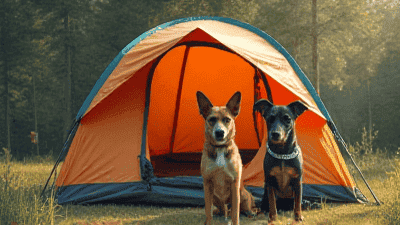
Camping is a fantastic way to reconnect with nature, and bringing your furry friend along can make the experience even more enjoyable. Whether you’re a seasoned camper or a beginner, camping with pets requires careful planning to ensure their safety, comfort, and happiness. From choosing the right gear to preparing for unexpected situations, there’s a lot to consider when taking your pet on a camping trip.
Before heading out, consider your pet’s temperament, health, and ability to handle the outdoors. Not all pets are suited for camping, so it’s important to assess whether your furry friend will enjoy the experience.

Choose a tent that’s spacious enough for you and your pet. Look for features like durable flooring to withstand claws and extra ventilation for airflow.
A comfortable bed will make your pet feel at home in the wilderness. Opt for a portable, waterproof option that’s easy to clean.
These lightweight, space-saving bowls are perfect for on-the-go feeding and hydration.
Pack enough food for the entire trip, plus extra in case of emergencies. Bring your pet’s favorite treats for rewards and comfort.
A sturdy leash and harness are essential for keeping your pet safe and under control. Consider a long lead for campsite exploration.
Include essentials like bandages, antiseptic wipes, tweezers, and any medications your pet may need.
Always clean up after your pet to minimize your impact on the environment.
For larger dogs, a backpack can be a great way for them to carry their own food, water, and toys.
If you’re camping in warm weather, bring a cooling mat or vest to help your pet stay comfortable.
Attach reflective tags or lights to your pet’s collar to ensure visibility at night.
Ensure your pet is comfortable with basic commands like “sit,” “stay,” and “come.” Socialize them with other animals and people to minimize stress.
Visit your vet before the trip to ensure your pet is up-to-date on vaccinations and flea/tick prevention. Discuss any concerns, such as allergies or anxiety.
Make sure your pet’s ID tags are current and consider microchipping for added security in case they get lost.
Before embarking on a multi-day trip, take your pet on shorter outings to see how they handle the outdoors.

Look for campsites that allow pets and offer amenities like pet waste stations and nearby trails.
Each campsite may have specific pet policies, such as leash requirements or restricted areas. Familiarize yourself with these rules to avoid any issues.
Choose a location that’s suitable for your pet’s needs. For example, avoid areas with extreme temperatures or dangerous wildlife.
Even if your pet is well-behaved, it’s important to keep them leashed to prevent them from wandering off or encountering hazards.
Extreme heat or cold can be dangerous for pets. Plan activities during cooler times of the day and provide shelter as needed.
Keep an eye out for wildlife that could pose a threat to your pet, such as snakes or predatory animals.
Use flea and tick prevention products and check your pet regularly for any signs of infestation.
Always ensure your pet has access to fresh water and a shaded area to rest.

Explore nearby trails with your pet, but choose routes that are appropriate for their fitness level.
If your pet enjoys water, find a safe spot for them to swim and cool off.
Bring toys like balls or frisbees for a game of fetch at the campsite.
Enjoy the sights and sounds of nature together. Your pet’s curiosity can make the experience even more rewarding.
Bring your pet’s favorite blanket, toy, or bed to provide comfort in an unfamiliar environment.
Stick to your pet’s regular feeding and walking schedule as much as possible to reduce stress.
Consider using calming sprays, collars, or supplements to help your pet relax.
Reward your pet with treats and praise to create positive associations with the camping experience.
If your pet gets lost, immediately alert campsite staff and start searching nearby areas. Use your pet’s ID tags or microchip information to aid in their recovery.
If your pet becomes ill or injured, contact the nearest veterinary clinic or animal hospital. Your pet first aid kit can help address minor issues.
In case of severe weather, seek shelter immediately and ensure your pet is safe and secure.
Always pick up waste and dispose of it properly to keep the campsite clean and protect the environment.
Keep your pet from chasing or disturbing wildlife to maintain the natural balance.
Stick to designated trails to prevent damage to vegetation and minimize your impact on the ecosystem.
Share inspiring and entertaining stories of pets enjoying their camping adventures. These anecdotes can offer practical tips and encouragement for fellow pet owners.
Camping with your pet can be a rewarding experience that creates lasting memories. With the right preparation, gear, and mindset, you and your furry friend can enjoy the great outdoors together safely and comfortably. Whether you’re hiking through the woods, lounging by the campfire, or stargazing under the night sky, every moment spent with your pet will make the trip even more special. So pack your bags, grab your pet’s essentials, and embark on an unforgettable camping adventure!